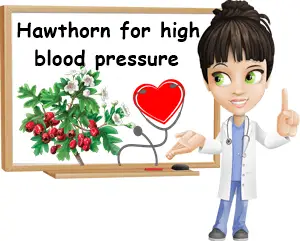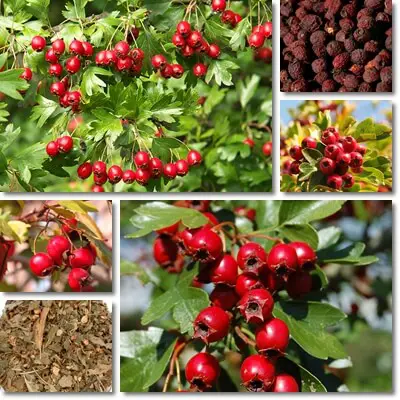Hawthorn is best known as a heart tonic, supporting cardiac function and improving symptoms of heart failure. But hawthorn is also one of the best herbs to take for high blood pressure.
The berries, leaves and flowers all help lower blood pressure numbers with excellent results. Find out how hawthorn preparations lower blood pressure and what is the best dosage for high blood pressure treatment.
How does hawthorn lower blood pressure?
According to research, hawthorn owes its blood pressure-lowering benefits primarily to biologically active proanthocyanidin antioxidants such as procyanidins, but also other bioactive polyphenols. Hawthorn lowers blood pressure numbers by dilating blood vessels which improves blood flow to and from the heart.

Studies show hawthorn also exerts cholesterol-lowering, anti-inflammatory and antioxidant effects and counteracts damage to blood vessel walls, reducing risks of atherosclerosis and associated side effects such as high blood pressure.
Hawthorn tea acts as a diuretic, balancing electrolytes and promoting the elimination of excess sodium, with benefits for blood pressure.
5 Benefits of hawthorn for blood pressure
1) Vasodilating effects
One way hawthorn helps lower blood pressure is via vasodilation. Studies show hawthorn contains biologically active chemicals that inhibit two enzymes, the angiotensinconverting enzyme (ACE) and the phosphodiesterase enzyme (PDE) (source).
The ACE and PDE enzymes act as vasoconstrictors, narrowing blood vessel walls via contractions in blood vessel walls.
Bioactive proanthocyanidin flavonoids in hawthorn inhibit these two enzymes causing a vasodilating effect that helps widen blood vessel walls and improve blood flow, achieving lower blood pressure numbers.
The vasodilating benedits of hawthorn were attributed to berries and flowers.
2) Improves blood circulation
Another way hawthorn is good for high blood pressure is by improving blood circulation. Studies show hawthorn has a vasodilating action and helps widen blood vessel walls which allows for increased blood flow to and from the heart.
Hawthorn has also demonstrated an anti-atherosclerotic action. Atherosclerosis causes plaque buildup on the inside of artery walls and their subsequent thickening, and leads up to reduced blood flow. The anti-atherosclerotic benefits of hawthorn are conducive to better blood circulation and are sustained by anti-inflammatory, antioxidant and anti-hyperlipidemic effects.

3) Anti-atherosclerotic benefits
Hawthorn indirectly promotes healthy blood pressure numbers by exerting an anti-atherosclerotic action.
Atherosclerosis is a long-term, chronic disease that causes artery walls to lose elasticity and thicken which restricts blood flow and raises blood pressure numbers.
Research has demonstrated hawthorn has an anti-atherosclerotic action brought on by several therapeutic activities, namely anti-hyperlipidemic, antioxidant, anti-inflammatory and reparative effects.
For one, hawthorn helps lower levels of LDL cholesterol, triglycerides and total cholesterol.
Excess cholesterol contributes to plaque formation on the inside of artery walls.
Hawthorn also exerts an antioxidant action, preventing oxidation of blood cholesterol, primarily LDL cholesterol, and other lipids. Oxidized cholesterol is one of the main sources of plaque buildup on the inside of blood vessel walls.
Oxidation of blood cholesterol and other lipids also triggers inflammation via a immune system response in which white blood cells are sent to eat oxidized cholesterol. Inflammation is a known trigger for atherosclerosis. Studies demonstrate hawthorn exerts a strong anti-inflammatory action, disrupting inflammatory processes that contribute to plaque formation on the inside of artery walls. Finally, hawthorn has been shown to reduce endothelial cell injury (source) and the endothelium (the inner surface of blood vessel walls) from damage that may contribute to plaque buildup and atherosclerosis.
4) Anti-clotting action
Normal blood supply to and from the heart can be affected by the presence of blood clots. Blood clots form as a result of platelet aggregation, which is when platelets or thrombocytes, cells normally present in the blood, clump together restricting blood flow. Hawthorn has been found to reduce blood coagulation parameters, contributing to reduced platelet aggregation (source) and lower risk of blood clots and associated cardiovascular events. This, in turn, holds benefits for blood circulation and, by extension, for blood pressure too.
5) Diuretic benefits
Hawthorn tea has diuretic properties, increasing urine output. Hawthorn tea helps regulate body fluids and electrolyte levels in the blood, encouraging the elimination of excess sodium with benefits for high blood pressure.
See more benefits of hawthorn tea.
How much hawthorn berry extract should you take for high blood pressure?
Amounts as high as 500 mg to over 1.5 g of hawthorn berry extract have been investigated for their anti-hypertensive benefits, with successful results. However, hawthorn has been found to interact with blood pressure lowering medication and can lower blood pressure too much. If you are considering taking hawthorn berry extract for high blood pressure, talk to your doctor about what is the best dosage for you specifically.
How much hawthorn leaf extract should you take for high blood pressure?
Hawthorn leaf extract and leaf, berry and flower extracts have been used successfully to treat high blood pressure. However, hawthorn interacts with blood pressure lowering medication which is why it is advised to first consult with your doctor about what is a safe dosage for you.
How much hawthorn tea for high blood pressure?
Anywhere from 1 to 3 cups of hawthorn berry tea, hawthorn leaf tea or mixed hawthorn tea (berry, leaf, twigs, flowers), can be consumed daily for high blood pressure. However, one of the risks of hawthorn is it can lower blood pressure too much, especially in combination with blood pressure lowering medication, and cause side effects such as hypotension (blood pressure that is too low), lightheadedness, dizziness, fainting etc. So talk to your doctor about what is the best dosage for you specifically.
What are the side effects of hawthorn?
- Medicine interactions: hawthorn interacts with medication for high blood pressure (beta-blockers, calcium channel blockers etc.), medication for high cholesterol, heart failure, arrhythmia, anticoagulant medication etc.
- Allergic reactions with the potential for anaphylactic shock.
- Digestive upset with symptoms such as nausea, stomach cramps, loose stools.
- Cardiovascular side effects: palpitations, extrasystoles, high heart rate, hypotension, fatigue.
- Side effects affecting the nervous system: agitation, alertness, anxiety.
